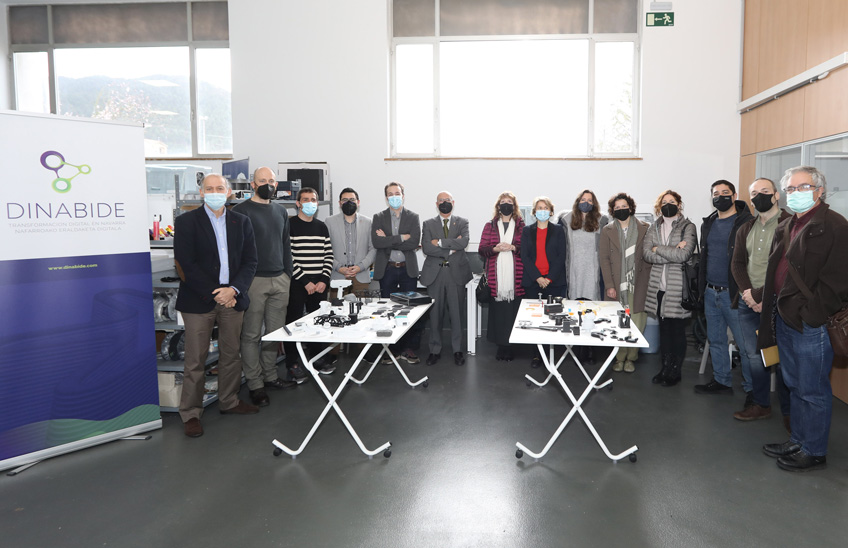International students will carry out internships in Navarre towns affected by depopulation in the framework of an Erasmus + project in which the ICS participates.
The presentation of KiNESIS in the Comunidad Foral has run to position of Ruth Breeze, local coordinator of the initiative and principal investigator of the group 'Public discourse' of the ICS, and of Daniela Chavarría, of the University L'Orientale of Naples.

FotoGobiernode Navarra/
21 | 02 | 2022
Students from Italy, Germany, the Netherlands and Estonia will carry out internships in towns affected by depopulation in Navarre at framework of the project KiNESIS : knowledge partnerships for social innovation in the face of depopulation.'. Among the partners of this initiative are the group 'Public discourse' of the Institute for Culture and Society of the University of Navarra and the Observatory of the Social Reality of Navarra, of the Regional Government. KiNESIS has a duration of three years (2021-2023) and is co-funded by the Erasmus+ Program of the European Commission.
The act of presentation of the initiative has taken place in Dinabide, a space located in Irurtzun that has the goal to generate a community of knowledge, entrepreneurship and experience oriented to the digital transformation of Sakana. The event was attended by the Minister of Territorial Cohesion of the Government of Navarra, Bernardo Ciriza.
The presentation of KiNESIS has been position by Ruth Breeze, local coordinator of the initiative and principal investigator of 'Public discourse' of the ICS, and Daniela Chavarría, of the L'Orientale University of Naples and coordinator of project under the supervision of Johanna Monti.
The internships, which will last between 1 and 6 months, will be carried out in the following municipalities: Aibar, Javier, Liédena, Rocaforte, Sangüesa, Yesa, Petilla de Aragón, Fitero and Cáseda. In each of the localities, the vacancies will meet a specific demand: mapping the impact of the Aragonese Way of St. James, organizing a national competition around the figure of Ramón y Cajal, improving the Education in Fitero, highlighting figures of artists of Sangüesa (1122-2022), reducing the negative environmental impact, the study of the historic center of Fitero, and the study of the Devil's Bridge of Lumbier.
The workshop, in which some of the main initiatives carried out from the Agency of development of Sakana have also been announced, has concluded with the visit of the Multipurpose Center for the Aging of Allo, a space for social innovation that will improve the quality of life of the elderly in the area.
European practices to generate knowledge
The European internships aim to promote the partnership of young researchers and the communities concerned in order to find possible solutions. The vacancies offered are divided by areas of study in History and Heritage, Tourism, Marketing, Communication, development of Applications, Urbanism, Education, Art, Ecology, Technology, Sociology, Psychology, Architecture, Projects with Renewable Energies and specific problems.
Students will be accompanied and training throughout their stay. In addition to the introductory program, in which financial aid helps the young person researcher to adapt to the place of arrival, continuous support is provided throughout the process. KiNESIS also offers an intercultural opportunity to collaborate with other international students from whom to learn different ways of working. The duration of the internship ranges from one to six months. In addition to the financial aid for the accommodation of 300 euros, students can apply for the scholarship Erasmus, of up to 1,000 euros, and a 200 euro grant to cover flight costs.
Share knowledge at subject of depopulation
The KiNESIS program aims to address depopulation with new, innovative and multidisciplinary approaches, which are applied to teaching and learning. To do so, it relies on the creation of a network of exchange, flow and co-creation of knowledge locally and globally.
In this way, the different educational institutions contribute their experience in the research and applied science to generate useful data on the territories that are being depopulated, the causes of the reduction and possible solutions. With the information gathered, pilot tests are carried out to extract parameters and action models that can be transferred and applied to other program scenarios.
As a formative and research novelty, KiNESIS proposes the direct connection of students and institutions with real-life cases. Thus, through the network of vacancies available in places at risk of depopulation, it aims to link the training to the solution of specific social problems. Students settle in the territory to support communities and help local companies with their knowledge.
